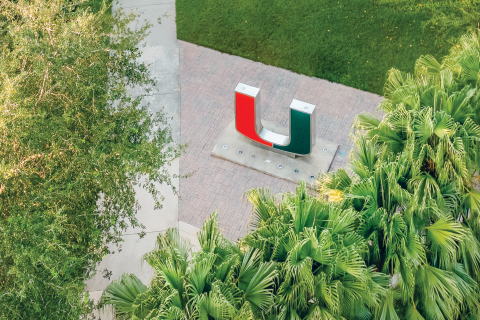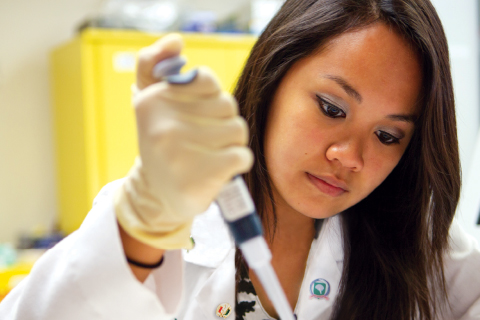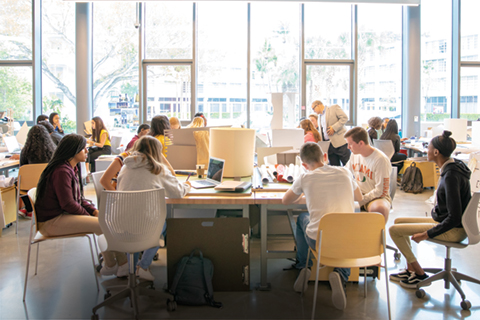- Brighter health
- Brighter science
- Brighter planet
- Brighter education
- Brighter champions
- Brighter arts
- Brighter opportunities

Billiant minds: Brighter world
Scholars. Doctors. Scientists. Conductors. Curators. Innovators. The University of Miami encompasses a vibrant, varied community of dreamers and doers. They are the people who make the U ever stronger, ever bolder, and ever brighter.
Donor generosity has a profound impact on the students and change-makers who honor our ideals and shape our University’s future.
Areas of focus
The stories featured here showcase just a few of the remarkable people at the University of Miami who are leading change and inspiring hope across seven key areas of focus.
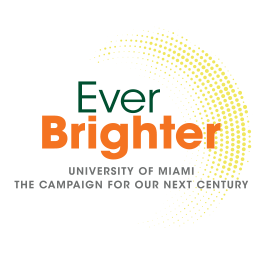
Brighter health
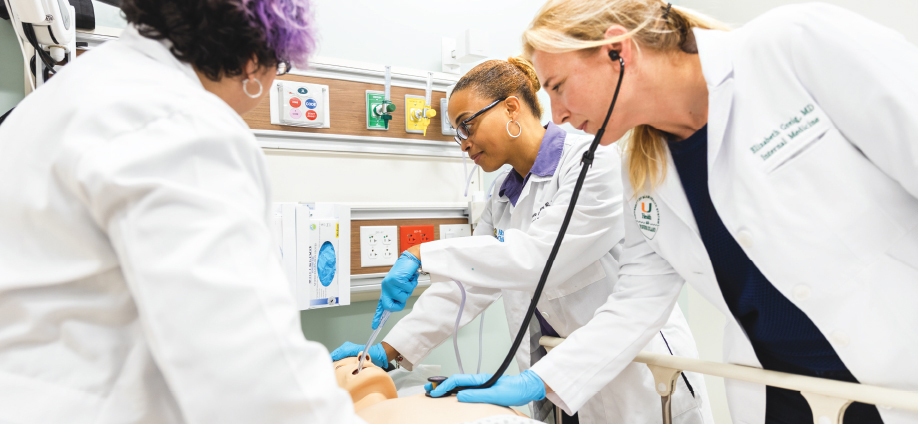
UHealth – University of Miami Health System and the Miller School of Medicine are tasked with educating the next generation of compassionate health care providers and visionary researchers, enhancing the well-being of every patient we serve, and promoting health equity throughout South Florida and beyond. We’re up to the challenge. Our health teams at our No.1-ranked Bascom Palmer Eye Institute are working toward the completion of the first human eye transplant in history. At Sylvester Comprehensive Cancer Center—the only National Cancer Institute-designated center in South Florida—breakthrough cancer treatments are in development. Established in 1948 as South Florida’s first collegiate nursing program, the School of Nursing and Health Studies has built a stellar reputation through its programs in nursing, the health sciences, and public health, as well as through a fully equipped simulation hospital that practices and prepares students, health care professionals, and first responders for real-life medical situations.
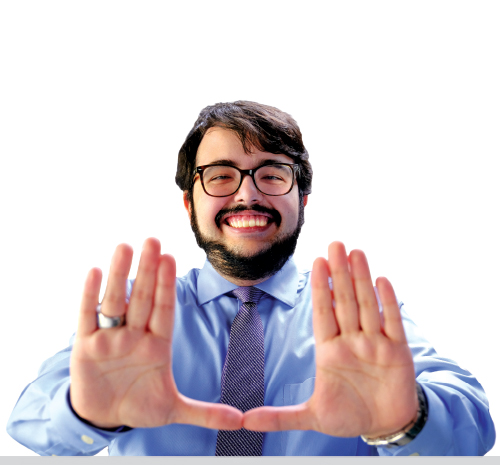
NEVER GIVE UP
“I hope to be the kind of doctor who never forgets what it’s like to be a patient,” says Antonio Fontanella, B.S. ’20. At the age of 3, Fontanella was diagnosed with nephrotic syndrome, which eventually progressed to focal segmental glomerulosclerosis (FSGS) and kidney failure. It was during his kidney transplant that he was introduced to the University for the first time—an experience he’ll never forget. “Despite the complications I experienced during the transplant, I had a fantastic medical team that refused to give up on me,” he says. “Thanks to their hard work and dedication, I was finally able to leave the hospital after 40 days.” When Fontanella eventually returned to the University of Miami, it was for his undergraduate studies. He is now pursuing a medical degree at the Miller School of Medicine, where he studies the condition that nearly cost him his life. “No matter how long it takes, I want to cure FSGS,” he says. “I want to look into the eyes of a patient suffering from the disease I had as a kid and tell them, ‘It’s going to be OK’— and mean it.”
Brighter science

Every day, our researchers work to pursue treatments for the world’s most complex diseases, increase our knowledge of the oceans, and develop new technologies to make our world greener and safer. The University has earned prominence as a visionary research institution; each year we receive more than $380 million in research and sponsored program expenditures to support revolutionary discoveries across a range of disciplines. At the College of Engineering, we’re building on our strengths in materials engineering and expanding our reach in chemical engineering and aerosol sciences to improve the human condition. The College of Arts and Sciences’ Institute of the Mathematical Sciences of the Americas facilitates and disseminates research in mathematics and its applications across the hemisphere and beyond. The Miller School of Medicine receives more National Institutes of Health (NIH) funding than any other medical center in Florida—grants that enable our researchers to continue to push the boundaries of science.
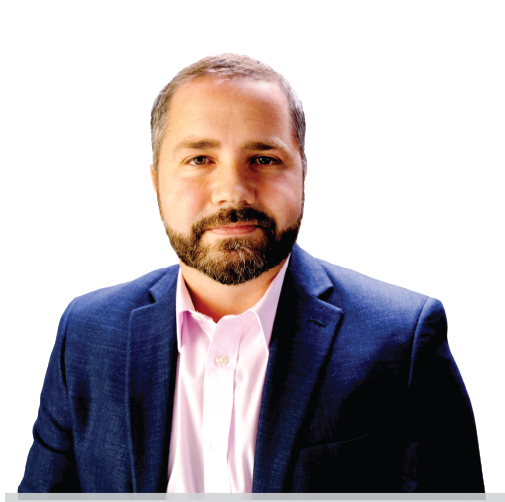
BRINGING A CURE FOR BLINDNESS WITHIN SIGHT
A stem cell biologist and biomedical engineer at the University, Daniel Pelaez, M.S.B.E. ’07, Ph.D. ’11, is nothing if not an optimist. As part of the eye transplantation team led by Dr. David T. Tse at Bascom Palmer Eye Institute, Pelaez is confident of the eventual outcome of the team’s visionary research. “I wake up each day knowing we’re closer to regenerating or restoring eyesight for those who can’t see,” he says. “Regeneration is all around us in nature; I firmly believe that kind of healing power can help cure blindness.” For Pelaez, teaching is as strong a passion as research. “I encourage students to explore new boundaries, be creative, stay on top of new technologies, and keep an open mind,” he says. “I’m proud to be associated with a place that’s producing excellent clinicians and passionate scientists who are committed to improving the eyesight of people around the world.”
Brighter planet

Climate change represents the greatest challenge of our time—one that hits exceptionally close to home, as our University is situated in one of the world’s coastal cities most vulnerable to extreme weather events and sea level rise. Dedicated researchers at the University of Miami are applying their expertise and front-line knowledge to help mitigate the impacts of climate change and forge a more sustainable future. The Rosenstiel School of Marine and Atmospheric Science has built the world’s only hurricane simulator capable of generating Category 5 force winds and waves over water, which will increase our understanding of the science of hurricanes and their regional impact. The School of Architecture is envisioning the future for urban environments, designing more resilient communities that improve the health, safety, and well-being of all residents. The Miami Herbert Business School is the first to offer a STEM-certified master’s-degree program in sustainable business, preparing a generation of environmentally responsible, tech-savvy leaders well versed in green business and its positive impacts on the world.
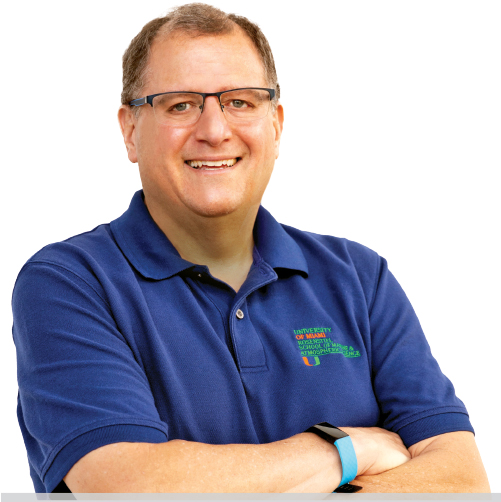
FORECASTING THE FUTURE
Ben Kirtman’s interest in the variability of the Earth’s climate began as a child, when his father tasked him with pumping water out of their family’s California basement each time it flooded from El Niño rainfall. He has now come full circle. As a professor at the Rosenstiel School of Marine and Atmospheric Science, he has led efforts to improve the federal government’s operative forecasts of El Niño’s impact in North America since 2016. Kirtman credits his exceptional students and colleagues for the University’s leadership in climate models. “The U has the people and the infrastructure needed to develop and fine-tune sophisticated predictive systems,” he notes. “Together, we’re trying to address climate-related problems—and produce viable solutions—so that the next generation can look forward to a better, healthier environment. That’s our responsibility: to leave the planet better than we found it.”
Brighter education
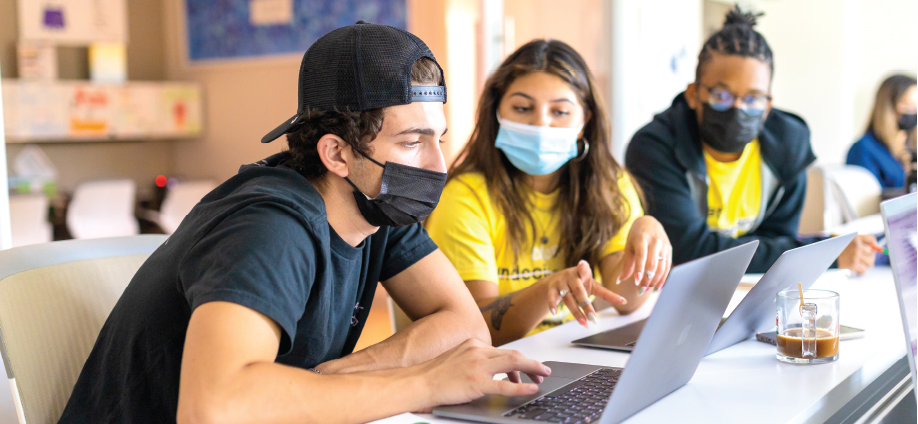
Unprecedented challenges, ranging from COVID-19 to online learning, have changed the paradigm of higher education forever. That’s why we’re reimagining the academic experience to help students thrive in a changing world. The University is committed to creating an environment that embraces personalized and differentiated learning styles and platforms, elevates educational technology, supports the success of every student, and advances global human endeavor. The School of Education and Human Development is advancing the science of teaching and learning in ways that will spark innovation in our classrooms and improve learning outcomes across diverse communities. We’re also investing in hands-on experiences—from clinics offered through the School of Law that provide legal services for low-income clients to the in-house advertising agency at our School of Communication—that prepare graduates for rewarding, fulfilling careers.
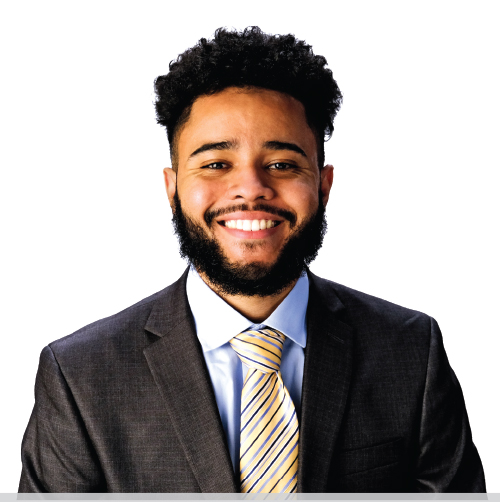
BUILDING COMMUNITY
“Growing up biracial made me realize the importance of culture, representation, and community building,” explains Miles Pendleton, B.S. ’21, who credits his hometown of Eugene, Oregon, with his drive to enter public service. When he arrived on campus, Pendleton immediately began engaging with our vibrant community through activities that included co-founding the University’s NAACP chapter and mentoring high school students through the Inspire U program. After graduating summa cum laude with a quadruple bachelor’s degree in Africana studies, political science, sociology, and criminology, he’s returning home to serve as the recently appointed president of the Eugene/Springfield NAACP branch. “The U believed in me—it brought forth a version of myself that even I couldn’t see,” he says. “Going forward, I hope do the same for others.”
Brighter champions

The Hurricanes have garnered exceptional competitive achievements, winning 21 national team championships—including five football national championships—and more than 80 individual national titles. We’re equally successful at preparing student-athletes for success after college. Our student-athletes achieve graduation rates above the average of their Division 1 peers and continue to earn distinction on the Atlantic Coast Conference honor roll. Thanks to their dedication to athletics and impressive classroom achievements, ’Canes succeed everywhere—from stadiums to boardrooms—winning both on the field and in their field of choice.
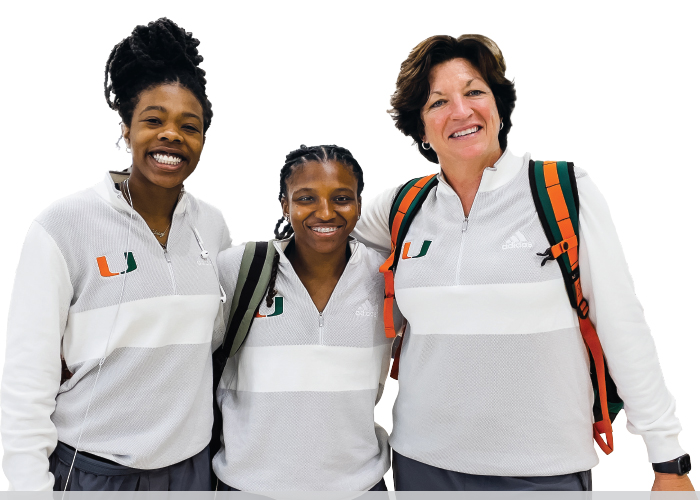
GAME-DAY GRATITUDE
Women’s basketball head coach Katie Meier never takes game day for granted. “Part of my pre-game routine is to show how thankful I am for this opportunity,” she says. “It’s incredible to watch my players do what they love and do it with excellence.” Off the court, Meier encourages her players to exemplify that same spirit of appreciation in their studies and community engagement. “The U has classrooms full of wonderful professors,” she says. “Much learning also happens in the interactions between classmates who come from diverse backgrounds and are eager to make new discoveries.” Meier is confident that her players will shine as leaders in whatever career they choose. “If they’ve received an education here and played for me and my staff, then they’ve been challenged at the highest level,” she notes. “I truly believe they represent the very top of their peer group. And I can’t wait to see where they go next.”
Brighter art
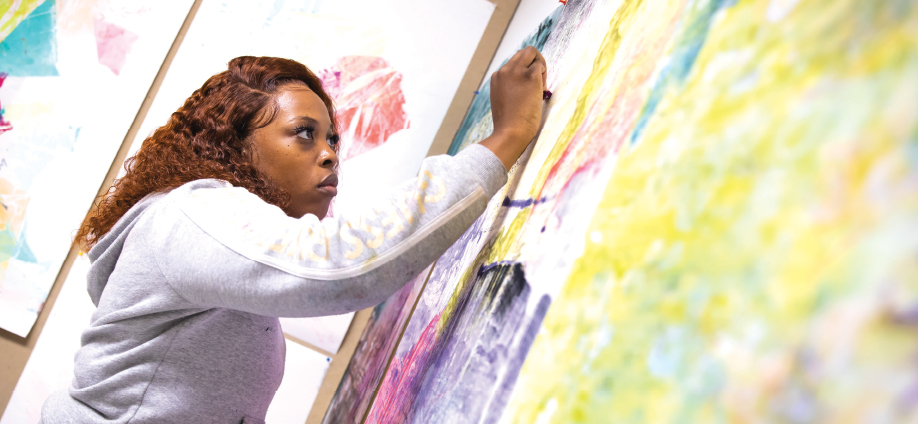
The University of Miami plays a pivotal role in nurturing and celebrating our region’s eclectic culture and boundless creativity. We embrace excellence across all facets of the arts and humanities, as exemplified by the Frost School of Music’s track record of innovation as one of the top-ranked schools in the country and a model for music education in the 21st century. Our nearly 20,000 works of fine art in the Lowe Art Museum and our Cuban Heritage Collection at the University Libraries—home to the most comprehensive repository of materials on Cuba outside of the island—are shining examples of our depth in this field.

LEARNING BY LISTENING
When Gerard Schwarz, the Schwarz-Benaroya Chair in Conducting and Orchestral Activities at the Frost School of Music and director of the Frost Symphony Orchestra, walks across campus, he often bumps into students practicing outside. He’ll usually stop to listen and offer impromptu instruction. “I tell them, ‘Play me something difficult you’ve been working on,’” he says with a grin. This open, encouraging atmosphere reflects a deep sense of community and illustrates the wide-ranging diversity of a school where students and faculty members come together from a variety of backgrounds to create beautiful music. “What we do here is about making an important cultural contribution to society—and we need to fight for the things we consider important,” says Schwarz. “If we don’t, we’ll lose them. There’s always a brighter future, but we have to care deeply—and listen carefully—to create it.”
Brighter opportunities
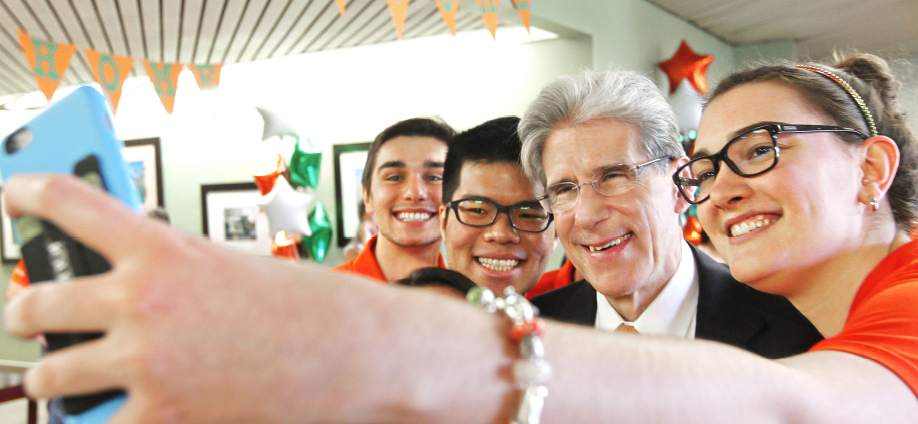
We’re committed to building a culture of belonging, where every member of our community is valued and has the opportunity to add value, and every student—regardless of where they begin in life—has equal access to opportunity. Many of our programs focus on promoting equity and addressing disparities in areas ranging from educational access to health care. For example, the Miami Herbert Business School’s undergraduate entrepreneurship program inspires students to take ownership of their financial destiny and pursue their entrepreneurial passion. Programming and mentorship opportunities offered through the Division of Student Affairs for veteran, LGBTQIA+, multicultural, and other student populations provide for a rich and inclusive learning experience to help pave a path to success while in college and beyond.
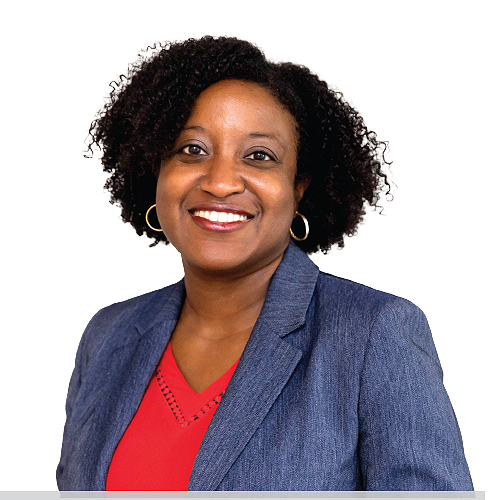
TRAINING COMPASSIONATE ADVOCATES
A professor of law and co-director of the Children and Youth Law Clinic, Kele Stewart represents children in the foster care system. She takes pride in equipping her students with the skills they need to succeed in the courtroom, producing empathetic graduates who provide top-tier advocacy for vulnerable populations. Stewart’s clinic recently participated in a class action lawsuit on behalf of children who weren’t receiving appropriate placements or mental health services—and won a favorable settlement. “Our students were front and center in helping to secure that victory,” she says. “One thing I admire about the current generation is how they don’t rely on traditional answers when it comes to solving problems,” she notes. “They figure out what needs to be done—and they do it.”
Copyright: 2026 University of Miami. All Rights Reserved.
Emergency Information
Privacy Statement & Legal Notices
Individuals with disabilities who experience any technology-based barriers accessing University websites can submit details to our online form.
